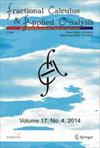Discrete-time general fractional calculus
IF 2.9
2区 数学
Q1 MATHEMATICS
引用次数: 0
Abstract
In general fractional calculus (GFC), the counterpart of the fractional time derivative is a differential-convolution operator whose integral kernel satisfies some additional conditions, under which the Cauchy problem for the corresponding time-fractional equation is not only well-posed, but has properties similar to those of classical evolution equations of mathematical physics. In this work, we develop the GFC approach for the discrete-time fractional calculus. In particular, we define within GFC the appropriate resolvent families and use them to solve the discrete-time Cauchy problem with an appropriate analog of the Caputo fractional derivative.
离散时间一般分数微积分
在广义分数微积分(GFC)中,分数时间导数的对应物是一个微分-卷积算子,其积分核满足一些附加条件,在这些条件下,相应时间-分数方程的考希问题不仅可以很好地求解,而且具有类似于数学物理中经典演化方程的性质。在这项工作中,我们开发了离散时间分数微积分的 GFC 方法。特别是,我们在 GFC 中定义了适当的 resolvent 族,并用它们来求解离散时间 Cauchy 问题与 Caputo 分数导数的适当类似。
本文章由计算机程序翻译,如有差异,请以英文原文为准。
求助全文
约1分钟内获得全文
求助全文
来源期刊

Fractional Calculus and Applied Analysis
MATHEMATICS, APPLIED-MATHEMATICS, INTERDISCIPLINARY APPLICATIONS
CiteScore
4.70
自引率
16.70%
发文量
101
期刊介绍:
Fractional Calculus and Applied Analysis (FCAA, abbreviated in the World databases as Fract. Calc. Appl. Anal. or FRACT CALC APPL ANAL) is a specialized international journal for theory and applications of an important branch of Mathematical Analysis (Calculus) where differentiations and integrations can be of arbitrary non-integer order. The high standards of its contents are guaranteed by the prominent members of Editorial Board and the expertise of invited external reviewers, and proven by the recently achieved high values of impact factor (JIF) and impact rang (SJR), launching the journal to top places of the ranking lists of Thomson Reuters and Scopus.
 求助内容:
求助内容: 应助结果提醒方式:
应助结果提醒方式:


